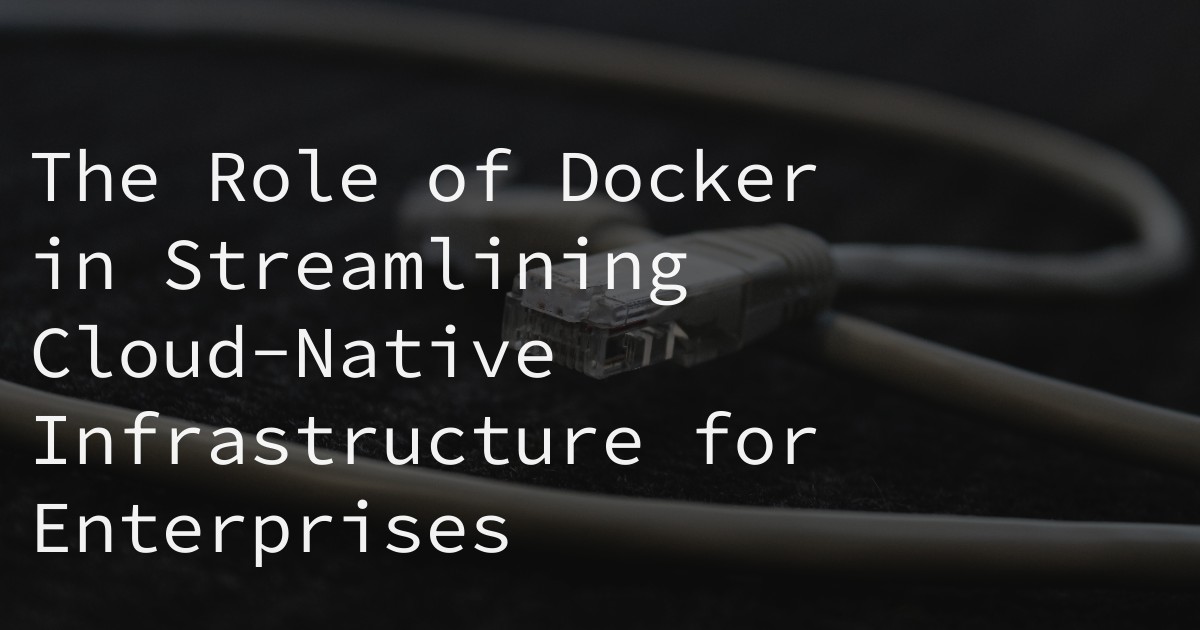
31 Oct The Role of Docker in Streamlining Cloud-Native Infrastructure for Enterprises
Cloud computing has revolutionized the way businesses operate, providing them with the flexibility and scalability needed to thrive in today’s fast-paced digital landscape. With the rise of cloud-native computing, enterprises are now able to take advantage of even more efficient and streamlined infrastructure solutions. In this article, we will explore the role of Docker in streamlining cloud-native infrastructure for enterprises, and how it can help businesses achieve their goals in a cost-effective and scalable manner.
Benefits of using Docker for cloud-native infrastructure
Docker, a popular containerization platform, has become an essential tool for enterprises looking to optimize their cloud-native infrastructure. Here are some of the key benefits of using Docker:
- Containerization for improved application deployment and management: Docker allows for the creation of lightweight, isolated containers that can be easily deployed and managed, making it easier for enterprises to scale their applications.
- Consistent and portable development environments: With Docker, developers can create consistent environments for their applications, regardless of the underlying infrastructure, ensuring that their code runs smoothly in any environment.
- Resource optimization and cost savings: By using Docker, enterprises can optimize their resource usage, leading to cost savings in terms of infrastructure and maintenance.
- Simplified application scaling and load balancing: Docker’s container orchestration capabilities make it easier for enterprises to scale their applications and distribute the workload across multiple containers, ensuring high availability and performance.
- Faster iteration and deployment of updates: With Docker, enterprises can easily deploy updates and new features to their applications, reducing the time to market and improving their agility.
Streamlining container-based infrastructure for enterprises
While containerization has many benefits, managing and scaling containers can be a challenge for enterprises. This is where Docker comes in, providing solutions to overcome these challenges:
- Challenges faced by enterprises in managing and scaling containers: Enterprises often struggle with managing and scaling their containers, especially as their infrastructure grows in complexity.
- How Docker helps in overcoming these challenges: Docker’s container orchestration capabilities, along with its integration with other tools and platforms, make it easier for enterprises to manage and scale their containers.
- Integration with existing infrastructure and tools: Docker can be easily integrated with existing infrastructure and tools, making it a seamless addition to the enterprise’s technology stack.
- Cross-platform compatibility and support: Docker is compatible with various operating systems and platforms, making it a versatile solution for enterprises with diverse technology needs.
- Versatility and flexibility for various use cases: Docker can be used for a wide range of use cases, from simple web applications to complex microservices architectures, making it a valuable tool for enterprises of all sizes and industries.
Improving efficiency and scalability
With Docker, enterprises can not only streamline their container-based infrastructure, but also improve its efficiency and scalability. Here are some ways in which Docker can help:
- Leveraging orchestration tools like Kubernetes for efficient container management: Docker integrates seamlessly with popular orchestration tools like Kubernetes, allowing enterprises to efficiently manage their containers at scale.
- Automation of tasks through CI/CD pipelines: By automating tasks such as testing, building, and deploying applications through CI/CD pipelines, enterprises can save time and resources, while ensuring a consistent and reliable deployment process.
- Infrastructure as code for scalability and consistency: With Docker, enterprises can define their infrastructure as code, making it easier to scale and maintain their container-based infrastructure in a consistent manner.
- Monitoring, logging, and tracing for performance optimization: Docker provides tools for monitoring, logging, and tracing container performance, allowing enterprises to identify and resolve issues quickly, leading to improved efficiency and performance.
- Networking and storage solutions for seamless communication and data management: Docker offers networking and storage solutions that enable seamless communication between containers and efficient data management, making it easier for enterprises to build and deploy complex applications.
- Utilizing service mesh for secure and efficient communication between microservices: With Docker, enterprises can implement a service mesh, a dedicated infrastructure layer for managing communication between microservices, ensuring secure and efficient communication within the containerized infrastructure.
- Implementing security measures for protecting the containerized infrastructure: Docker provides built-in security features and also integrates with other security tools, allowing enterprises to protect their containerized infrastructure from potential threats.
- Adopting DevOps/DevSecOps/FinOps practices for continuous improvement and cost optimization: Docker supports the adoption of DevOps, DevSecOps, and FinOps practices, enabling enterprises to continuously improve their processes and optimize costs.
Conclusion
In conclusion, Docker plays a crucial role in streamlining cloud-native infrastructure for enterprises. Its containerization capabilities, along with its integration with other tools and platforms, make it an essential tool for optimizing and scaling container-based infrastructure. By leveraging Docker, enterprises can improve their efficiency, scalability, and agility, while also reducing costs and improving security. As cloud-native computing continues to evolve, Docker will undoubtedly play a significant role in shaping the future of enterprise infrastructure.
RELATED ARTICLES:



Sorry, the comment form is closed at this time.